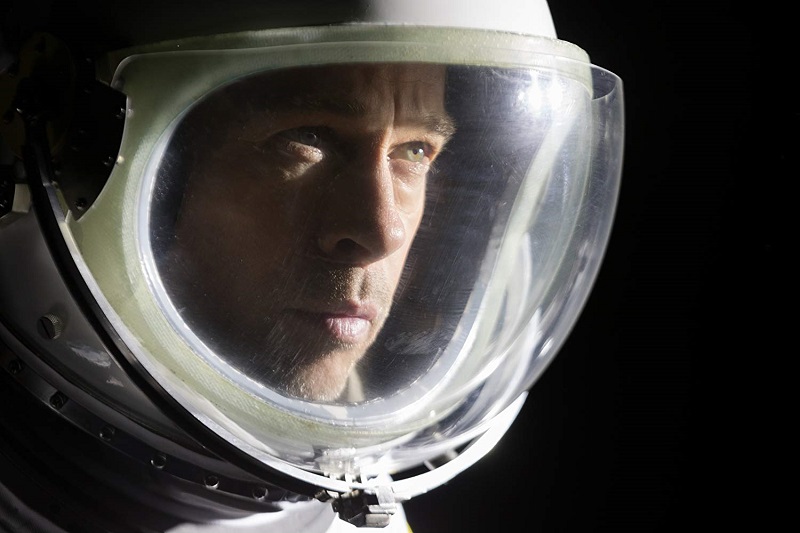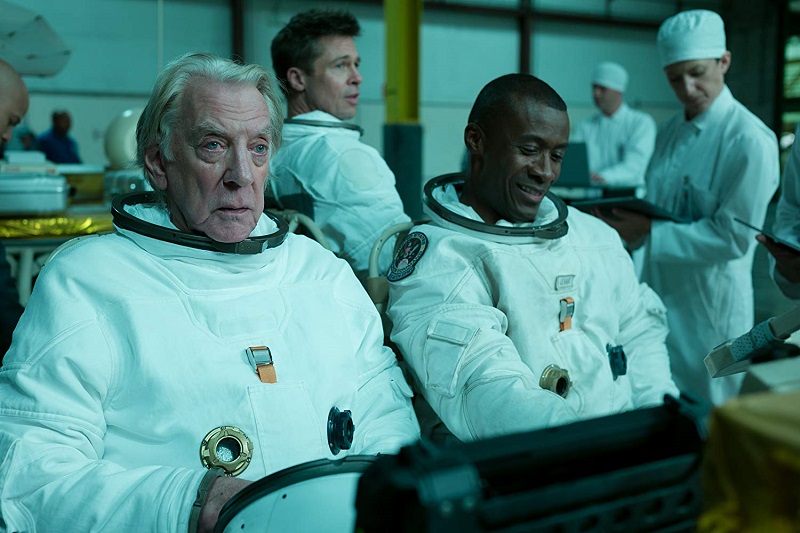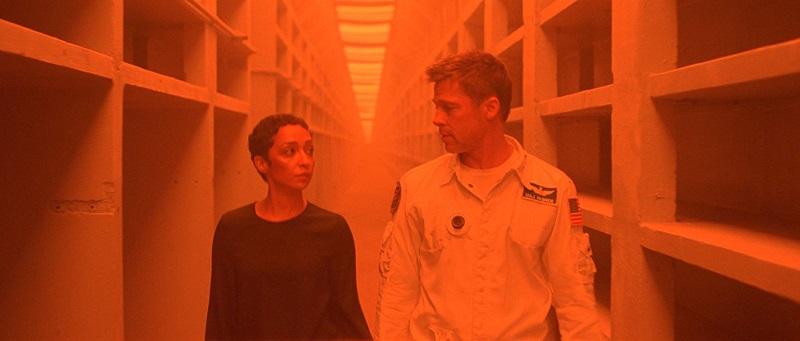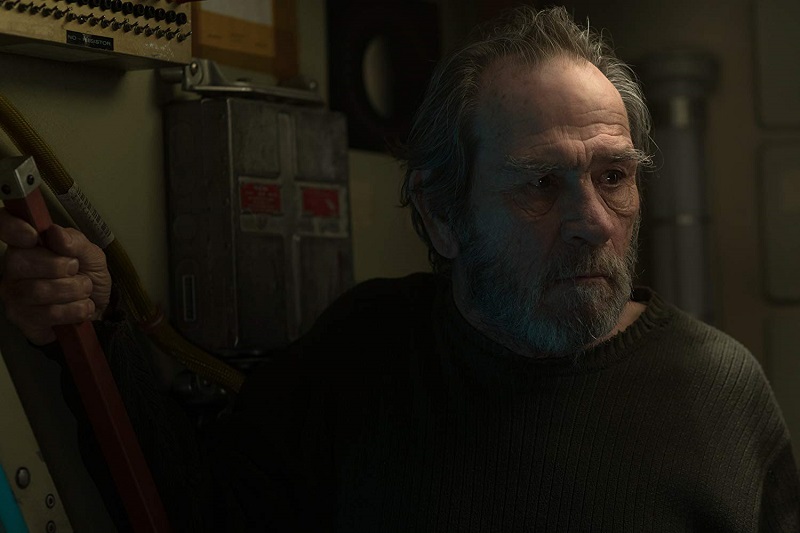Space movies that make you think are right up my alley. Give me a Gravity or Moon every day of the week. Ad Astra has some faults, but star Brad Pitt is downright interstellar and the visuals (in IMAX especially) and sound design were otherworldly. The plot, mostly, will stick with you.

Ad Astra is also a solid contribution to the father-son milieu of movies. Pitt is an astronaut and the reason he became one is due to his father (Tommy Lee Jones). Pitt’s Major Roy McBride is literally following in his pop’s, H. Clifford McBride, footsteps. Sixteen years prior to current day (in James Gray’s movie timeline—which is labeled as “the near future”), the senior McBride took off on a mission to explore the corners of our solar system in search of intelligent life. At some point, the ship disappeared and all onboard were feared dead.
Now, the United States Space Command has what it believes is solid evidence that not only is Clifford alive and well, but he is behind what has been labeled “The Surge.” Electrical impulses from deep space are sending everything on Earth into a tizzy that has claimed tens of thousands of lives (thus far). Those in charge have tapped the good Major to fly to the Moon, catch a ride to Mars and then … to paraphrase Buzz Lightyear, to infinity and beyond.
In all seriousness …. the fate of the planet firmly sits in his hands.
For the second time in three months, Pitt has delivered a remarkably nuanced performance. In late July, audiences were wowed by his stunt double character caught in the middle of a fantastical version of the Manson Family Murders. This time out, he emits cautious confidence as a military trained space traveler who is notorious for his ability to keep his heart BPM under 60—even in the direst of circumstances. The Space Station explosion scene that kicked off that compelling Ad Astra trailer and found Pitt’s spaceman hurdling towards Earth? Still under 60 BPM! Subtlety—as laid out in Gray and Ethan Gross’ screenplay—Major McBride’s ability to remain the picture of stability is thrillingly put to the test. Familial issues can always find a way to send that heart-rate racing. Being stuck on the other side of Saturn and unsure how to find your way to safety, coupled with fatherly foibles, well … that will combine to send stress soaring.
Along for the ride, and serving as a terrific tool of plot stirring, is another movie legend, Donald Sutherland (as Thomas Pruitt). Through his (brief) conversations with Pitt’s McBride, not only does the viewer learn valuable information that contributes to the emotional pull of this tale, but practical world-building points are made as well. Sometimes motion picture expositional moments can feel forced. But Gray and Gross have masterfully interwoven their informational needs and emotional ebbs and flows throughout.
The visual mastery of Ad Astra is exquisite. Cannot recommend witnessing it on IMAX screens more—this is exactly the type of cinematic experience that begs for it. It also takes a larger-than-life movie star to be able to anchor a film like this—especially on the largest screens known to humankind—and Pitt is in practically every single scene. For a two-hour sci-fi intellectual entertainer, it is almost even more important than usual that the thespian at the center of this adventure be able to command our attention for that entire running time.

The performance, and the landscape with which the actor is working within, must feel purely organic in its birth, growth and resonance. Pitt achieves that and so much more. The veteran actor’s turning in the best work of his career of late. Walking out of Once Upon a Time in Hollywood, my thoughts immediately went to the fact that Leonardo DiCaprio was good, sure, but Pitt was utterly electric. Leaving Ad Astra, the feeling was slightly different. The adjectives utilized to capture something that is elusive to describe as an actor’s performance were gotten by digging deep into the mental thesaurus.
I’m not ignoring what Jones did as Pitt’s papa. It’s just that to discuss anything to do with what the Oscar winner achieved with his latest turn would drift into spoiler territory. Let’s just say that his persona has to be so larger than life that there is a continuous shadow that hovers over the mission, Pitt’s character and honestly—the entire solar system. With the titanic talent level of Jones, that is certainly achieved. Sutherland too is great (as always!) in a role that could have been thankless, but in his hands, comes across as exactly what Gray needed for the aforementioned reasons.
This is a male-heavy picture, but it is not without female roles. They could have been pumped up further and sadly, that is something that costs the film in terms of authenticity. Ruth Negga’s (Loving) Helen Lantos possesses a role similar to the one that Sutherland serves, but she is not given as much prose to bite into compared to what Sutherland gets. She is an enormous help to Pitt’s character in terms of him being able to see not only the finish line of his mission, but his ability to emotionally compartmentalize his paternal issues. Being able to identify which emotions have their place in this mission, and which ones do not belong anywhere near Pitt’s conscious or subconscious is as important as his technical resume.

Then, there is Liv Tyler. The fantastic actress barely gets to utter any words as Major McBride’s ex-wife, Eve. Some things are hinted at when it comes to Eve and her role in Roy’s life—such as how the career always came first with the men and women who comprise Space Command. Much of what we see of her is in flashbacks. Much of what we hear from her is drowned out by the swelling score of Max Richter, which gets utilized more than the actress’ talents.
There is also an issue with parts of the third act that feels as if there are plot muddling where there should be plot movement. This is the part of the film where hearts should be beating rapidly, and armrests are being gripped. Instead, my mind wandered. That is not what you seek from a “makes you think” sci-fi thriller. The remainder of the film is paced perfectly. The end … solid. The beginning and first act-second act bridge … done with panache. It is just that mid-third act emotional and dramatic swell that catapults us into our searingly satisfying conclusion isn’t much of a swell at all.
Lucky for us, Pitt is there to grab us by the lapels. Why? Because of one enormous reason … the actor has gotten us so wrapped around his fingers, that we remain focused on the prize—the successful completion of his mission. It is truly a gift what he achieves in this role. If what he did in Once Upon a Time in Hollywood and Ad Astra are the examples of what audiences can expect from Mr. Pitt during this chapter of his career, the galaxy is the limit.

I have long appreciated the work of Gray. He is a writer-director who deserves the attention that this film should give him. In 2016, he gained a boost in appreciators of his work with the terrific The Lost City of Z. The filmmaker first caught my eye with the one-two punch of 2007’s We Own the Night and 2008’s Two Lovers. Those three films alone, show a unique voice that Gray has and with Ad Astra now, he has shown that his tales—whether they be interpersonal or interstellar—will always be grounded in a reality that is defined by rich characters that we are invested in, until the very end.
Grade: B

